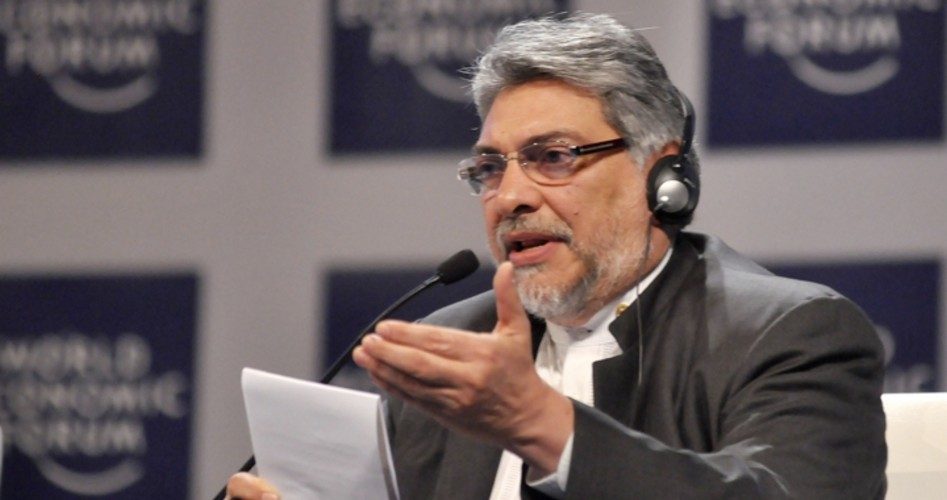
When former Paraguayan President Fernando Lugo Méndez was lawfully impeached by united lawmakers in late June, Latin America’s powerful socialist leaders denounced the move against their comrade as a “coup” against “democracy.” Despite the fact that the impeachment by a democratically elected Congress followed constitutional procedures and was endorsed by the nation’s Supreme Court, the outcry against the ouster and Paraguay’s new leader is still growing.
More than a few Latin American governments have already recalled their ambassadors, refusing to recognize former Vice President Federico Franco as the country’s new legitimate president. An assortment of regional bodies like the socialist-dominated South American Union (UNASUR) and the Mercosur “free-trade” bloc are taking action as well, with the new Paraguayan government being suspended and banned from meetings. More retaliation is potentially in the pipeline.
The suspension from the transnational regimes is set to last until at least the next presidential election, now scheduled for April of 2013. But the move has already allowed the socialist Venezuelan regime to achieve its longtime goal of joining Mercosur over Paraguayan objections. In Paraguay, however, fury is rising quickly over the multilateral attacks.
“They don’t have a right to kick us out of any meeting,” complained Paraguayan Foreign Minister José Félix Fernández Estigarribia, referring to the recent actions banning the new leaders from participating in multilateral negotiations. “We are the government of Paraguay, elected by the Congress that removed Lugo from office.”
Latin America’s ruling socialist clique, however, disagrees. And the situation is still getting worse, with land-locked Paraguay essentially surrounded on all sides by hostile far-left governments, including the rulers of Brazil, Argentina, and Bolivia.
Talks of sanctions against the nation have not died down yet either, even though the ousted former president has said such a move would only hurt the people. Meanwhile, socialist strongman Hugo Chavez of Venezuela has reportedly halted regular oil shipments to Paraguay already, as the two governments trade accusations of meddling.
The socialist Venezuelan regime claims the “Yankee” U.S. government may have helped orchestrate the impeachment — Chavez called it a “coup” — as part of its campaign of “imperialism” in Latin America. The new government of Paraguay, meanwhile, has withdrawn its delegation to Venezuela and expelled the regime’s diplomats from Asuncion after accusing Chavez’s minions of unlawfully interfering in domestic Paraguayan affairs.
According to Paraguay’s top political leaders, Chavez and his allies may have even tried to persuade Paraguayan military chieftains to take up arms in defense of the impeached ex-president — a dangerous scenario, to say the least, which could easily result in mass bloodshed. Video camera footage reportedly shows Venezuelan Foreign Minister Nicolas Maduro meeting secretly with top Paraguayan military officials at the presidential palace in Asunción during the impeachment trial.
The socialist regime in Venezuela has not responded to the allegations yet, and open tensions between the two governments are still escalating dangerously. Some analysts even expect a full break in diplomatic relations — or worse — if the situation does not improve soon.
The dispute that ultimately led to Lugo’s impeachment involved a law-enforcement operation to evict a group of so-called “landless farmers” from a politically connected former senator’s property that they had forcefully occupied. After acquiring a court order, the chief of the eviction operation and his deputy, with their weapons holstered, approached the occupiers for discussions.
Despite the presence of hundreds of police, the two law-enforcement leaders were promptly shot dead — supposedly by more radical “infiltrators” among the occupiers. More violence ensued, and by the end of the battle, six officers and 11 landless peasants were dead. Dozens more were wounded in the firefight, too.
Of course, the deadly showdown was not the only reason Lugo, a controversial former Catholic Bishop, has come under fire. Consider, for example, that he is known to have fathered at least two children during his time as a Catholic bishop. There are also allegations that he conceived a child with an underage girl.
The Paraguayan constitution allows presidents to be impeached for “poor performance of his duties,” a relatively low threshold. So, on June 21, the lower house voted 76 to one for impeachment charges. The Senate formally expelled him from office the next day, with just four senators supporting Lugo against 39 in favor of removal.
Lugo, obviously, cried foul. “The democratic process in this country is broken,” the controversial far-left ideologue complained, saying he hoped “international organizations will have the maturity and the courage to say that there has been a break in the democratic process and that it merits a sanction.” More than a few multilateral institutions leaped to his defense.
Despite the socialist hysteria about an alleged “coup,” however, the impeachment procedure followed the guidelines laid out in Paraguay’s constitution to the letter. The ouster was ultimately endorsed by the nation’s Supreme Court and another judicial body, too, though the deposed leader is now asking the court to reconsider.
Most of the international controversy surrounding Lugo’s impeachment hinges on the amount of time he was offered to present his defense before the Senate — two hours. Other critics have seized on U.S. embassy documents released by WikiLeaks to claim that Paraguay’s other political parties had been plotting to impeach him for years — hardly a crime or a “coup.”
Analysts say it would not have made any difference how long Lugo had defended himself anyway, because lawmakers had already decided that he had to go. But according to the more agitated critics of the impeachment, Paraguay has now become a “democraship” — a hybrid between democracy and dictatorship.
Others disagree with that characterization. As numerous analysts have noted, one of the reasons Paraguay’s legislature has so much leeway in removing presidents is that the nation suffered under a dictatorship for decades. Plus, everything was done properly, and international retaliation will end up hurting both representative, constitutional government and the people of Paraguay — especially the poor.
Thor Halvorssen, the founder and president of the New York-based Human Rights Foundation, explained in a recent analysis for Forbes that “the democratic order has remained intact in Paraguay and it is essential for international actors to consider the damage they could do to Paraguayan democracy if they fail to recognize the current, and demonstrably legitimate, government of Paraguay.”
Much of the outcry, meanwhile, is coming from characters with no legitimate basis to complain about a lack of “democracy” anyway. “It is no surprise that every president calling for Lugo’s reinstatement is a perfect example of an unchecked executive branch eroding democracy and weakening human rights,” Halvorssen observed, citing Chavez and other socialist strongmen in the region involved in “muzzling the press and harassing the opposition to confiscating property and seeking to perpetuate themselves in power.”
“No wonder they are so concerned,” Halvorssen concluded.
Numerous analysts and critics of the impeachment have also compared it to the 2009 ouster of then-Honduran President Manuel Zelaya, who was ham-handedly removed from office for flouting the nation’s constitution and Supreme Court. But even if one accepts the premise that ousting the far-left Zelaya could have been handled better, it does not change anything about the legitimacy of Paraguay’s impeachment process.
Where the escalating dispute over Paraguay’s government goes from here remains to be seen. The socialist alliance under the shadowy Foro de Sao Paulo (FSP) banner hopes to have Lugo reinstated, and they appear determined to make that happen at any cost.
For the sake of constitutional government and the people of Paraguay, however, observers hope that the nation can move on as quickly and peacefully as possible while retaining its institutions and legitimate leaders in place until the next elections. The alternatives — violence, lawlessness, or perhaps even a socialist coup — would be an unmitigated disaster for the country and the region.
Related articles:
Resurgent Communism in Latin America
South American Union Selects Socialist Leaders
Olavo de Carvalho on Communism in Latin America
South American Union Seeks Regional Law Enforcement
With UN Support, Socialist Chavez Disarms Civilians in Venezuela
New Pacific Alliance Links Freer Latin American Nations
Photo of Fernando Lugo Méndez: World Economic Forum (www.weforum.org) / Edgar Alberto Domínguez Cataño



